Inside the eye of the storm
A case study into the abuse, harassment, and violence faced by a first-term city councillor in Aotearoa's fourth largest city
Content warning: discussion of harassment, abuse, attempted suicide, and murder, as well as examples of disinformation.
Do you know who Jo Cox is? I do. And I think about her often.
She was a member of parliament in the UK - for Batley and Spen, an electorate roughly the same size as the Hamilton West electorate. She worked in the charity sector before becoming an MP, she was head of policy and advocacy for Oxfam. In her maiden speech, she celebrated her electorate’s ethnic diversity and was a supporter of the Labour Friends of Palestine & the Middle East, and launched the all-party parliamentary group Friends of Syria.
Jo Cox was murdered in 2016. She was murdered in the street, outside a library where she was about to hold an open meeting for members of her electorate to chat with her. Her killer was a right-wing terrorist who had been engaging with white supremacist content and groups for many years.
I think about Jo Cox and the increasing danger of being in politics.
When I first ran for Hamilton City Council, I earnestly thought it was a 50-50 chance no one would care. We’re told all the time, right? No one cares about local government. Yet, within 24 hours of tweeting that I was going to be running, it had been retweeted by Patrick Gower, Jesse Mulligan, Marama Davidson, and Chlöe Swarbrick, and I had raised $1,000 from my website donation button alone. Within a month, I had been mentioned on New Zealand political podcasts, I had been interviewed on live primetime TV with The Project, and been invited to speak at the School Strike for Climate march in Kirikiriroa.
That publicity was more than I could have ever dreamt - but with it came immediate harassment. In that first initial reaction to my campaign, trolls targeting Marama Davidson were calling me a cunt in my mentions. I later shared this anecdote at a candidate event when asked about the challenges of running, and at least two members of the public told the organisers I should have been removed from the stage for using offensive language1 - this was the first moment I realised how complicit people were in this behaviour. When a prolific supporter of a right-wing political party and known Twitter troll tried to harass me online but found I had blocked them (a long time before), they started asking their followers if anyone knew me and if they could access my account.
Another city council candidate was constantly slandering me online for months - at its most ridiculous, they accused a random member of the public of being my mother (she was, in fact, a different grey-haired, older, Pākehā woman) and that she was turning up at events to undermine this candidate (she just went along to an event, asked a genuine question, and was wearing one of my tee shirts she had bought herself). They would write thousands of words about me on their Facebook page, and I often had members of the public messaging me to make me aware of what they were saying.
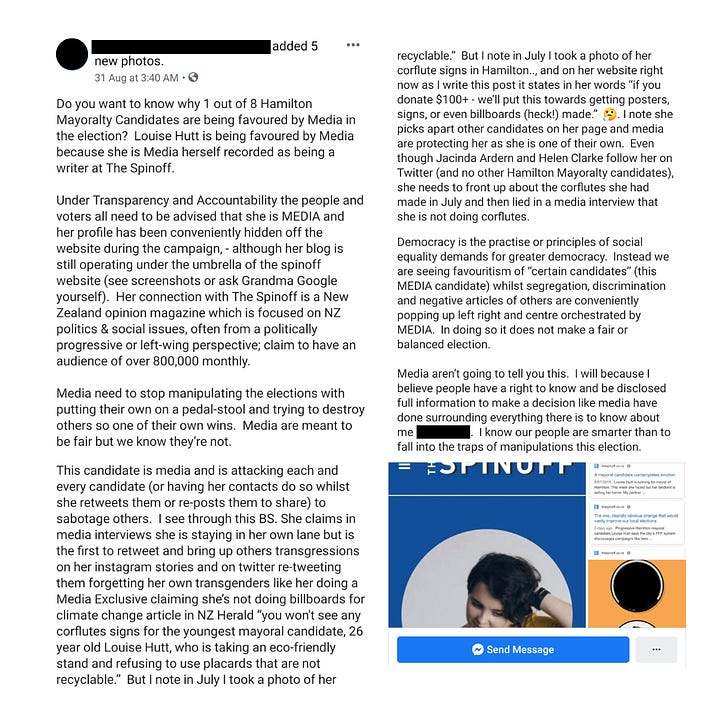
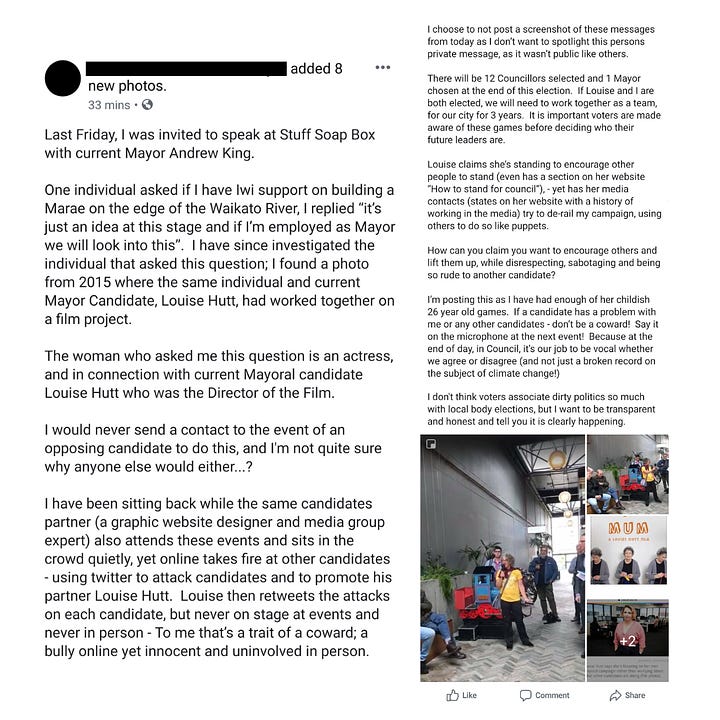
It wasn’t just online either; at one of the community-organised mayoral debates, a man aggressively followed me around the room to interrupt me speaking with other people and tell me that I was wrong for believing in climate change. He only stopped when fellow candidate at the time, Sarah Thomson (who is about a foot taller than me), physically stepped in to tell him to stop. Writing about the big mayoral debate MC-ed by Mike McRoberts, Hayden Donnell from The Spinoff described this charming heckle from the audience:
When Hutt brought up the fact that the other candidates weren’t mentioning climate change, a man sitting near the front couldn’t take it any longer. “That’s because it doesn’t exist, you silly bitch,” he called out, loud enough for the people in rows around him to hear.
At a political speed-dating event, as soon as I sat down, one person used their 10 minutes with me to rip into me personally and aggressively. They had clearly Googled me beforehand and didn’t like that I had written a piece about how hard it was as a young person to find housing security. They told me it was my fault as a ‘shitty, ungrateful, entitled millennial’ that our rental was being sold and we had four weeks to find somewhere to live whilst I was in the middle of a campaign. That was one of the lowest points of the campaign.
And then I lost that election, so you might think the harassment would stop. I’m just a normal member of the public again, just like anyone else.
Instead, two people who had been involved in a local right-wing and conspiracy-adjacent lobby group stalked my Facebook page for over a year. They would reshare anything I posted, just generally being nasty and cruel about anything I was doing or associated with. They only stopped when I shared images of their publicly available posts on Twitter - asking the philosophical question of why people have such strange hobbies. During the 2020 central government election, where I wasn’t a candidate, I had an Instagram post of mine shared to a group of supporters for a political party2, which turned into a thread with hundreds of comments discussing what a failure I was in intimate (and often incorrect) detail. They actively encouraged online pile-ons and I was targeted across all social media I used for about two weeks - if I blocked people on one platform, they’d simply message me on another. It took a social media influencer with 10x the followers I had stepping in and calling them out for it to stop.
While I might have been skeptical of the interest in my initial campaign, I did enter politics eyes-wide-open. I started getting interested in politics as well as using social media more heavily at the very point in which Dirty Politics was released. I had been blocking known Twitter trolls and bad-faith accounts for years, which is why I was harassed less than I might have been during the 2019 campaign - not necessarily because I had always wanted to be a candidate further down the line, but because they simply made social media a horrible experience. I also knew that the continued harassment after I was a candidate was likely because I had gotten so much attention in 2019 and ultimately came only 80 votes off being elected as a West Ward councillor. If you harass people out of running, they become less of a threat to the status quo - and I was an open threat to the status quo.
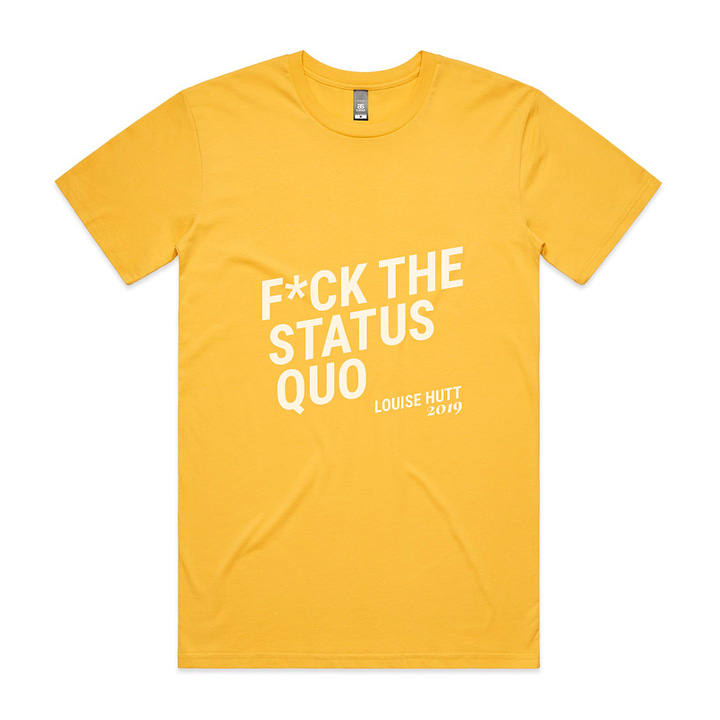
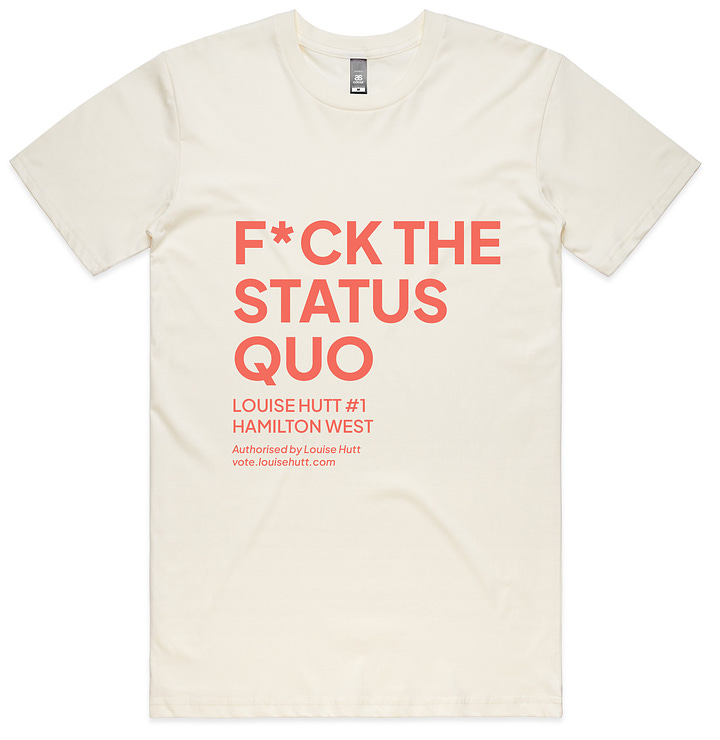
But that wasn’t enough to dissuade me (somehow) - and in 2022, I was elected. The campaign was different this time, as I wasn’t running for both mayor and council (just for council) and there were other people to pick on too. The theme of the 2022 election seemed to be a man who turned up repeatedly to harass the now-Councillor Sarah Thomson. He would interrupt events by heckling from the audience, and it got so aggressive that at the Western Community Centre event, he was told that if he did not leave, they would call the cops. But he did this at multiple events across the campaign. Imagine you were applying for a job, imagine you were in a job interview even, and someone turned up and shouted at you because they could. Imagine they turned up to every interview.
As a City Councillor now for a year and a half, it’s been a sobering introduction into the security risks of being a politician in little old Aotearoa. More than once, a member of the public got up to the Mayor & Councillor offices to harass elected members - so now I have multiple layers of security to go through before I even reach my office. Council staff and the Mayor have been visited by members of the public at their homes - and we were told to expect that people would visit us at ours. We have to be security conscious at home at all times, and a flow chart of what to do if someone will not leave your property is blu-tacked to the back of our front door. It makes for really bleak conversation when friends come over; they’re taking off their shoes at the door and say “so how’s work?” only to spot that chart. We regularly have security guards in the Council chamber now after the infamous Residents and Ratepayers public meeting, supported by CounterSpin Media. That was the one where the Deputy Mayor and another Councillor fled the building after a “writ of execution” and attempt at a “citizen’s arrest”.
While a lot of this harassment towards elected members can be summarised as general anger towards any form of government, fueled by post-COVID conspiracy theories and far-right movements, it does get personal. Rod Bowman, former President of the Residents and Ratepayers Association (yes, this is a theme), sent an email to former Mayors, current and former City Councillors, lecturers at the University of Waikato, and, unsurprisingly, the two people who had stalked me online while I wasn’t a city councillor or candidate. Sandwiched between a tirade of caps-lock, climate change denying, conspiracy theory is the statement:
“Councillors Sarah Thomson, Louise Hutt, Casey Cox [sic] and the rest of their Council Greenies … should be taken behind the bike shed and have the living shit beaten out of them”.
He signs it off “Kind Regards, Rod”. That wasn’t a very fun one to explain to my mother. Neither was the time I went to a community consultation event and a member of the public said “Oh, you’re here from Council? I’m here to beat you up” to me and a Council staff member. He laughed after saying that. I didn’t find it very funny.
That said, some have given me a right old chuckle.
I sometimes wish the things people wrote about me were true. I wish I got a free education. Unfortunately, I was too old to get first-year-free tertiary study - I know, bloody young people not being actually as young as you thought they were. I would love for them to give the IRD a call and let them know to write off my student loan. I’ve paid off $20,000 of it, working my “not real” jobs at the Waikato District Health Board, the University of Waikato, in technology and the electricity sector, and as a freelance creative, but still - not having $50,000 left to pay would be great.
Jokes aside, it’s been surreal to watch how disinformation and the rationale for abuse is seeded, and then how members of the public take it and run with it. A right-wing colleague of mine likes to make Facebook posts claiming, amongst other things, that I get to “cook up” all the “council’s nutty policies” via chairing a sub-committee. The awkward part is that I don’t chair a sub-committee - it would be nice if I did though! I chair a transport working group, which is a fancy title for a regular briefing to councillors, which has zero delegated power to make any decisions. All transport policies and strategies are agreed to by a majority of Councillors at the Infrastructure and Transport Committee - and if everyone is in attendance, that means 9 votes for something to pass3. No decision rests solely just on one individual, not even if you’re the Mayor - you have to convince 8 other people to join you. The current transport strategy was approved before I was even elected to Hamilton City Council4. Despite having these hot takes on what apparently happens there, and the working group being an open invitation to all Councillors and Maangai - Cr Taylor has never attended a transport working group meeting.
I wish we could criticise decisions rationally, thoughtfully, and truthfully, without petty name-calling, hyperbole, or deflecting responsibility for decisions. I often speak to my rationale for my vote, as do many of my colleagues, but that’s rarely accurately represented in these posts. Believe it or not, I don’t vote for things to frustrate the public, cause traffic congestion, make drivers “crazy” or force them out of cars, but you can see why some people rely on this type of rhetoric. Ryan Hamilton, the former Hamilton City Councillor and now National MP for Hamilton East, said the quiet part out loud to the crowd at the Residents and Ratepayers & CounterSpin event (regarding these types of transport projects); “it’s a very hard argument, politically, when you’re faced with injury or death or data”. Huh, what a good summary of the reasons I often do vote for things.
These comments are not without wider consequences, as I have often noticed that people outraged or angry when blame is placed on me as an individual - come directly to my page after commenting on the original post to harass and abuse me. I wish we could disagree with honour and integrity, so we might actually have a constructive conversation. A conversation where people are curious and open to understanding an issue - elected members take an oath promising to bring an “open mind” to Council, but the people whipped up into a rage from disinformation rarely return the sentiment.
I’m really aware that I don’t always get things right, I’m trying my best but that doesn’t make me perfect. I take my job incredibly seriously and there will be things that some people won’t like - heck, there are often decisions at Council that I also don’t like. What Cr Taylor might not tell you is that he and I were the only two people to vote against an extra $50,000 budget for the Mayor’s office to host foreign dignitaries in the Long Term Plan. But we lost that vote, and that’s sometimes how things go - I went over and shook his hand afterwards to highlight we do agree on things sometimes and neither of us spontaneously combusted.
It’s easy to describe how prolific online harassment is, but it isn’t the only avenue to try to drive people out of politics. Last year I was the subject of a complaint to the Office of the Auditor General (which was dismissed), as well as a code of conduct complaint to Council from a member of the public alleging ‘misandry’, among other things (also dismissed).
It was ironic to get a complaint about misandry when misogyny is well and truly alive. I’ve been shouted at in briefing sessions by a male councillor in front of senior staff and other councillors, the Youtube live stream has caught a male councillor sneering “is she going to cry” before I debated5, and I have even been asked if I was “smart enough” to know how to use the dishwasher when in the tearoom with a male councillor. I’ve also had to hear repeated derogatory comments about a councillor’s ex-wife in the Council chamber.
There’s always the same common denominator - both the Office of the Auditor General and the Hamilton City Council complainants had overlaps within far-right and conspiracy theory groups, and the complaints were shared and discussed online and in those groups before they were made. Often people talk about “Council wastage” but I think about the public servants and lawyers contracted to Council who are paid to read over malicious complaints like this. It can’t be cheap and it undermines due process and democracy when it's used as a weapon.
Being on Council has taught me that issues are often so much more nuanced than you realise and the wheels of local government are frustratingly complex. We do the public a massive disservice when we lead them down the wrong path because it’s easier to rark people up than it is to explain the debt-to-income ratio, how intersections pass a safety audit, or the central government criteria for funding. But our political system thrives off painting people as “villains” and “enemies” and channelling rage and frustration onto the individuals who put their name forward to inhabit public office - whether their rationale for that abuse is true or not.
And why would you want to inhabit public office? At our first Local Government New Zealand induction of the term, we were told of a deputy mayor - a young woman with a family - who left politics entirely because of the harassment her kids were seeing her get at the local supermarket. We can see the way Mayor Tory Whanau is being treated in real time. Christchurch City Councillor Sara Templeton was harassed by youth members of the National Party online until she went to the police about it. Our parliamentary system eroded the mental health of Kiritapu Allan and Golriz Ghahraman to the point of breaking. Kiritapu Allan tried to take her own life. Read that again. We knew since 2019 that Golriz was accompanied by a security detail because of constant death threats, as well as continuous threats of sexual and physical violence. A member of the National Party was served a tresspass notice for coming into Māori Party candidate (and now MP) Hana-Rawhiti Maipi-Clarke’s home in Huntly. James Shaw was attacked and beaten on his way to Parliament - coming away with a broken eyesocket. Former Prime Minister Jacinda Adern said at the time:
“We have an environment in New Zealand where politicians are accessible – and that’s something we should feel proud of. We are after all, here to serve people. But today’s events really show we cannot take that for granted”
“I think all of us will probably be united in wanting to ensure we have the kind of political environment where everyone can hold their views, but they can do that safely. When you go into politics in New Zealand you just don’t expect these things to happen”
That was in 2019, and we all know the events that followed as well as the death threats and overwhelming abuse that she would go on to face. I’m also cognisant that the abuse I’ve faced hasn’t been amplified by racism, as it is for others - a factor that cannot go unacknowledged.
But not everyone sees politicians feeling unsafe as a bad thing - this comment accompanies an article about city councillors needing to leave the earlier mentioned community meeting for their own safety.
Remember how I said I think of Jo Cox often? I think about what warning signs were missed. As I said, her electorate is about the same size as mine. Her killer has been described as believing individuals of liberal and left-wing political viewpoints, and the mainstream media, were the cause of the world's problems.
I’ll leave you with a comment from Hamilton City Council staff, taken from my request to be moved onto the unpublished electoral roll:
“Councillor Hutt is one of a subset of our elected members who has been identified as a person that could be subject to physical harm by a member of the public”.
I prefaced my statement that I was about to say a word some might find offensive, but wanted to be honest about how people were speaking about me.
Ironically this same party had once asked me to be a general election candidate for them.
14 Councillors + 1 Mayor + 1 Maangai Maaori = 16 votes total, and you need a majority so 9.
It was updated and confirmed at the August 2022 Infrastructure & Transport Committee. I was elected October 2022.
I was offered an apology for this remark only after a member of the public put in a code of conduct complaint about it.



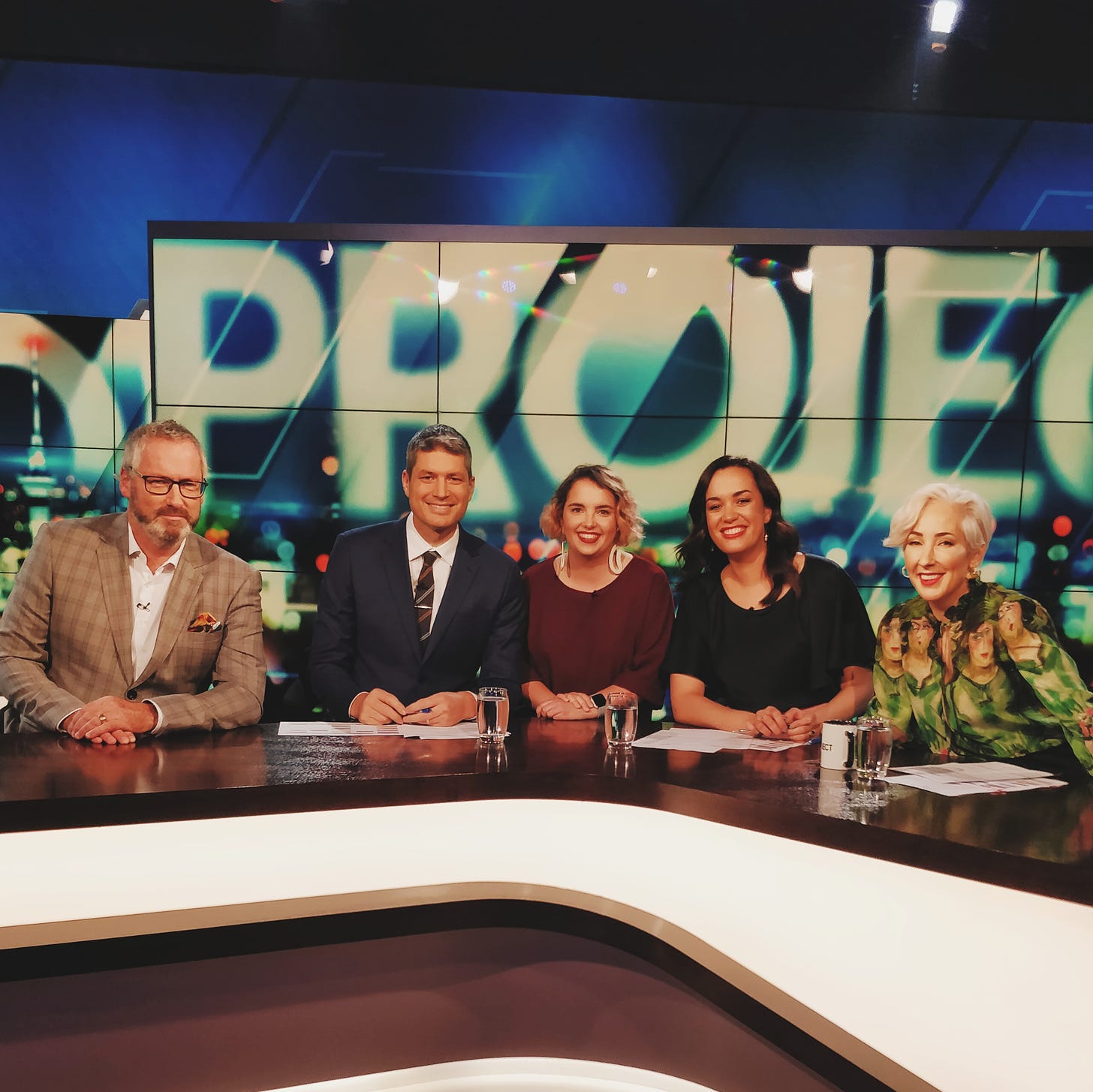
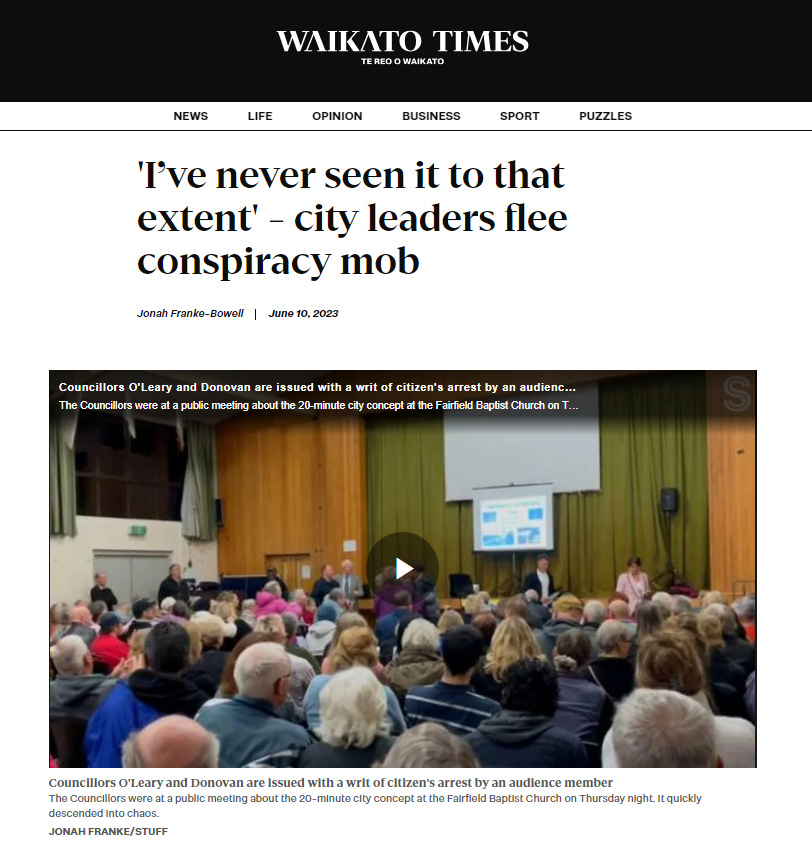
![ImageA screenshot from ‘Citywatch NZ’ Facebook page, which says: ‘@Hamilton City Council. Let’s have a look at Louise Hutt. She is 30, having had a free education on the tax payer, studied media arts, a job that doesn’t really contribute anything to society nor produce anything for society. Then by th elooks not had or held a real paying job, only carried out volunteer work. Then campaigned for Hamilton mayor and got a seat as councilor [sic], and so is now being paied by the rate payers. It is easy to see why Hamilton is in such a poor fiscal, infrastructure and societal condition. These like a couple of other Hamilton councillors are people with no real life, practical, logical, ethical, moral, family, work or budget skills. This is why these councilors [sic] think that a 25.5% rates increase year on year, is super acceptable, because for them the money just keeps flowing no matter what from the magical rate payer pot, having never worked themselves in a private company to make money to live. Involved with the Green Party and Bike Waikato. Have a look at this campaign website and judge for yourself. ImageA screenshot from ‘Citywatch NZ’ Facebook page, which says: ‘@Hamilton City Council. Let’s have a look at Louise Hutt. She is 30, having had a free education on the tax payer, studied media arts, a job that doesn’t really contribute anything to society nor produce anything for society. Then by th elooks not had or held a real paying job, only carried out volunteer work. Then campaigned for Hamilton mayor and got a seat as councilor [sic], and so is now being paied by the rate payers. It is easy to see why Hamilton is in such a poor fiscal, infrastructure and societal condition. These like a couple of other Hamilton councillors are people with no real life, practical, logical, ethical, moral, family, work or budget skills. This is why these councilors [sic] think that a 25.5% rates increase year on year, is super acceptable, because for them the money just keeps flowing no matter what from the magical rate payer pot, having never worked themselves in a private company to make money to live. Involved with the Green Party and Bike Waikato. Have a look at this campaign website and judge for yourself.](https://substackcdn.com/image/fetch/w_1456,c_limit,f_auto,q_auto:good,fl_progressive:steep/https%3A%2F%2Fsubstack-post-media.s3.amazonaws.com%2Fpublic%2Fimages%2Ff5b8cf98-ac04-4dc7-a60a-93f80a77fa0c_755x767.png)
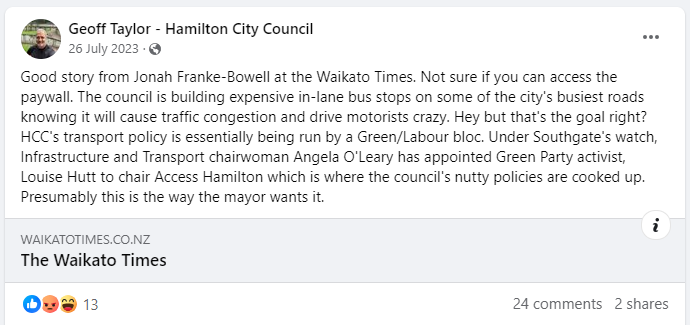
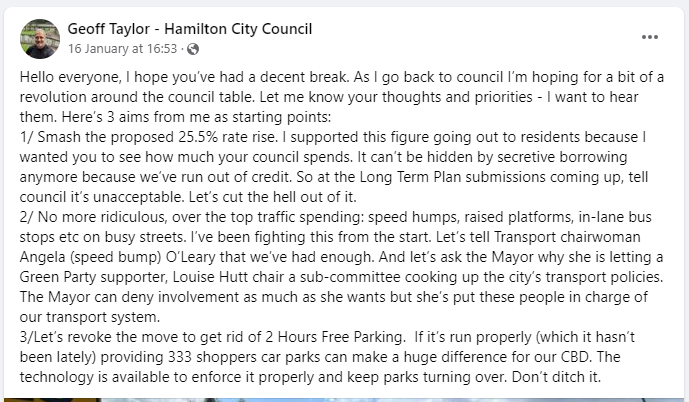
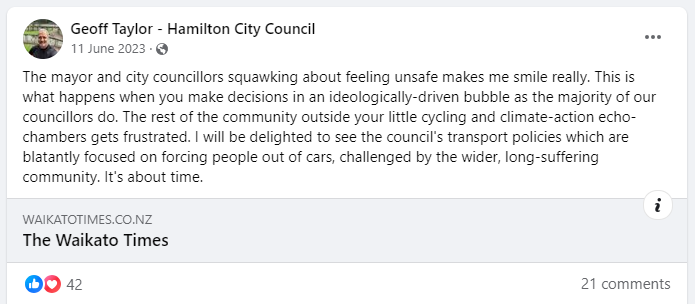
Well written description of the fortitude and bravery required to serve the community. We need more like you...
What on earth has happened to our so-called kindly little country? This is absolutely appalling & it must be called out. Thanks for writing about it Louise & let us work together to bring this abuse into the light of day & question the motivations/issues behind it.